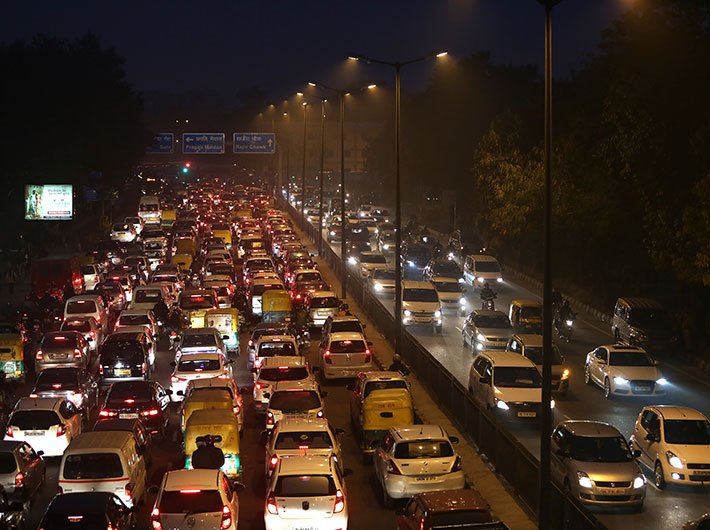Allowing only odd- and even-numbered cars on odd and even days respectively was one of the most disruptive policy interventions by the Aam Aadmi Party (AAP) . The success or failure of the 15-day pilot is argued with less evidence. The emotional tone is rather high when one talks about reduction of traffic and air pollution due to this formula. Though the pollution level remained constant, it reflected a positive outcome of government action. In the absence of this formula pollution levels might have increased. Meanwhile, another out-of-the-box policy – the bus rapid transit (BRT) – failed to survive. Linking the anecdotes on policy and judiciary interventions, it points to the unanimous need for government action to improve public transport. There is an unmet need for scientific research to facilitate evidence-based policymaking and bring legislations in line with public sentiment.
People’s cooperation in the implementation of the odd-even formula is a reflection that policy has succeeded to a large extent. Comparison between the BRT scheme of the previous government and the odd-even formula justifies that mere intent does not lead to the success in public policy implementation. BRT was right with intent, but failed because of poor design and bad timing. Running buses in the middle of a busy road turned out to be an impractical solution. On the other hand, the odd-even formula was introduced at a time when smog was high.
The sense of ‘ownership’ of the scheme and citizen involvement led to its success. It sought participation of citizens to achieve the dream of a pollution-free Delhi and motivated people.
This phenomenon can be better understood by a theory propounded by Mancur Olson in ‘The logic of Collective Action: Public Goods and the Theory of Groups’. It can be summarised as follows:
Collective Action = Cost of participation – value of public good (in this case pollution and traffic congestion) + selective benefits to the members of the society
Value of matters of ‘public good’ such as pollution and traffic congestion has undoubtedly reached its peak. Low traffic congestion on roads benefitted almost all commuters. Unlike the subtle and slow public action, odd-even came up with real-time results. The policy resulted in hassle-free driving at higher speed with lower fuel consumption along with lower emission of pollutants. The data of the CNG car fuel conversion during this period is yet to arrive, but it is estimated that more cars have converted to this eco-friendly fuel. Similarly, the road accident data is yet to be collated but there were fewer cases of road accidents and road age during this period. Cyclers and walkers felt more confident than ever. Thus, the cost of participation and promotion of the odd-even formula was much lower than the benefits accrued.
The popular logic of conspicuous consumption falls flat with massive public adherence to the 15-day policy. This followed Shanghai, Paris, Mexico model of odd-even. Learnings from the similar example in Beijing suggest measures that should be applied to create pathways for sustainable future. The CNG conversion sticker on the front glass should be replaced with green coloured number plate – symbolising ‘friends of environment’ which will create solidarity benefits.
Meanwhile, the Delhi government failed to recognise the role of private players. Instead of running DTC buses beyond capacity, it should create institutional architecture with public transport providers for long-term partnership. Evidence suggests that public investment and innovation are consequences of clarity and consistency in public policy. A good example would be the Delhi metro which delivers safe and affordable road transport services. Differential pricing during peak and non-peak hours in public transport, including the metro, would create options and incentives for the consumers to ease traffic load. Construction in public place should be stopped during this weather. The green cover of one of the greenest cities in the world is covered with dust; all trees seem to have changed their colour from green to grey.
Another important issue is efficient design of road crossings, which lead to accidents and congestion. Lastly, the traffic management is left to the traffic police. The use of technology to control and decongest traffic is negligible. It is time to synthesise knowledge and evidence for robust policymaking.
The registration of cars, including two-wheelers, has increased from 3.7 lakhs in 2007-08 to approximately 8.5 lakh up to March 2015. This trend is a reflection of rise in purchasing power and the shortcomings of the public transport system leaving the citizens with no options but to own a personal vehicle. To reverse this trend, the government has to act soon otherwise the green Delhi will remain a fading memory in the minds of the future generations. Also, AAP may not get a better opportunity to show its ability for redefining the politics of policy making.
Kumar teaches public policy and governance at Management Development Institute, Gurgaon
(The column appears in the February 1-15, 2016 issue)

